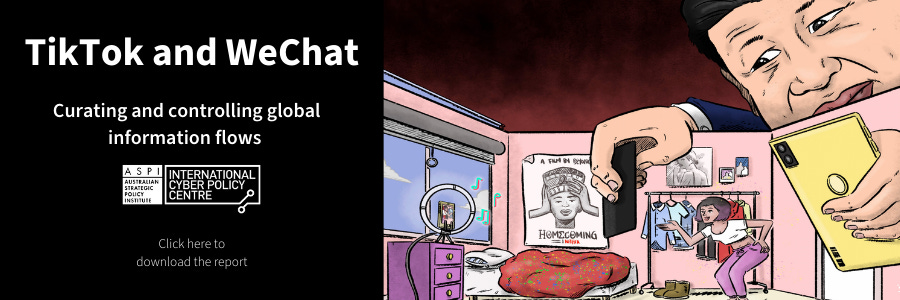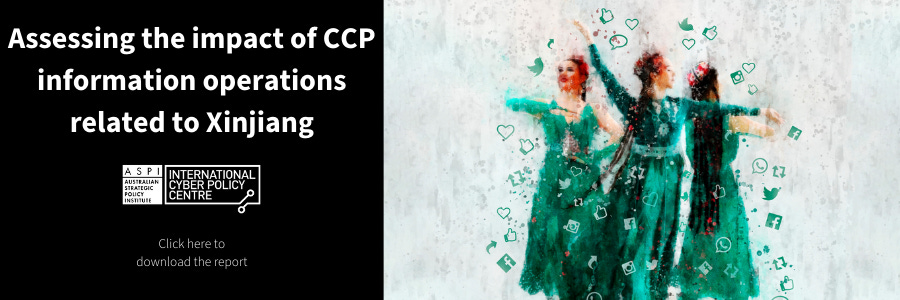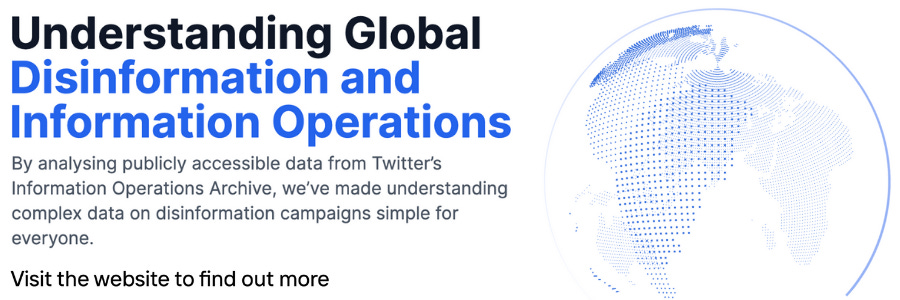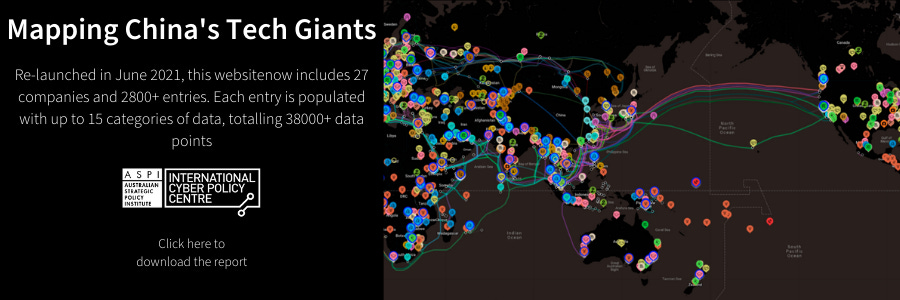Russia fines Google for refusing to bend to Putin’s war propaganda | Aussie audit reveals apps aimed at children were collecting personal data | China fines Didi $1.2 billion for poor data protection
Good morning. It's Friday 22nd July.
The Daily Cyber Digest focuses on the topics we work on, including cybersecurity, critical technologies, foreign interference & disinformation.
Have feedback? Let us know at icpc@aspi.org.au.
Follow us on Twitter and on LinkedIn.
This week, Russian regulator Roskomnadzor announced that a Russian court ordered the tech giant to pay its steepest fine yet since the Ukraine war started, citing Google’s “repeated failure” to remove “prohibited content” deemed “fake.” Ars Technica
The Coalition is urging the Labor government to implement new online privacy laws following an audit showing popular entertainment apps aimed at children were collecting and sharing personal data. The Australian
China’s internet regulator on Thursday fined ride-hailing giant Didi $1.2 billion for the company’s voracious data collection policies and lackluster security protections around sensitive user information. The Record by Recorded Future
ASPI ICPC
Even if TikTok and other apps are collecting your data, what are the actual consequences?
The Conversation
Ausma Bernot
By now, most of us are aware social media companies collect vast amounts of our information. By doing this, they can target us with ads and monetise our attention. The latest chapter in the data-privacy debate concerns one of the world’s most popular apps among young people – TikTok. In a 2020 Australian parliamentary hearing on foreign interference through social media, TikTok representatives stressed: “TikTok Australia data is stored in the US and Singapore, and the security and privacy of this data are our highest priority.” But as Australian Strategic Policy Institute (ASPI) analyst Fergus Ryan has observed, it’s not about where the data are stored, but who has access.


CCP seeks control over Xinjiang narrative as Xi visits the region
China Digital Times
Oliver Young
Over the past month, Xi Jinping concluded a “victory tour” of Xinjiang and Hong Kong, where his visits after years of absence signaled the CCP’s firm control over the two peripheral regions. However, recently documented CCP attempts to influence international opinion about these topics betray the government’s insecurity about letting its human rights record speak for itself. On Wednesday, the Australian Strategic Policy Institute (ASPI) released a report detailing how the CCP’s disinformation operations have deterred states, businesses, and civil society organizations from criticizing the CCP’s human rights abuses in Xinjiang.


Ukraine - Russia
Russia fines Google $370M for refusing to bend to Putin’s war propaganda
Ars Technica
Ashley Belanger
This week, Russian regulator Roskomnadzor announced that a Russian court ordered the tech giant to pay its steepest fine yet since the Ukraine war started, citing Google’s “repeated failure” to remove “prohibited content” deemed “fake.”
Cyber criminials attack Ukrainian radio network, broadcast fake message about Zelenksy's health
CyberScoop
AJ Vicens
Cyber criminals attacked a Ukrainian company that operates nine "major" radio stations to spread a message that Ukrainian president Volodymyr Zelenksy was in critical condition and under intensive care, Ukrainian officials announced Thursday.
Battling Moscow's hackers prior to invasion gave Kyiv 'full dress rehearsal' for today's cyber warfare
CyberScoop
Suzanne Smalley
More recently, in the weeks leading up to the Russian invasion, Ukraine suffered a series of breaches that officials blamed on Russia. These attacks helped prepare the country to battle back against Moscow's arsenal of digital weapons.
Australia
Kids’ online privacy threat
The Australian
Joe Kelly
The Coalition is urging the Labor government to implement new online privacy laws following an audit showing popular entertainment apps aimed at children were collecting and sharing personal data.
China
China cybersecurity agency fines ride-hailing giant Didi $1.2 billion for data issues
The Record by Recorded Future
Jonathan Greig
China’s internet regulator on Thursday fined ride-hailing giant Didi $1.2 billion for the company’s voracious data collection policies and lackluster security protections around sensitive user information.

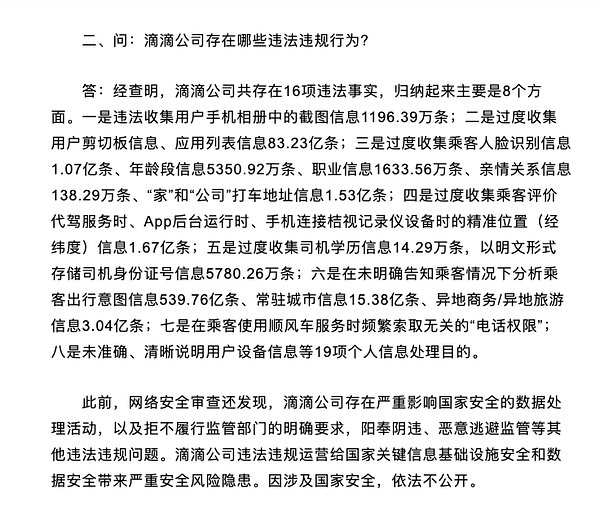
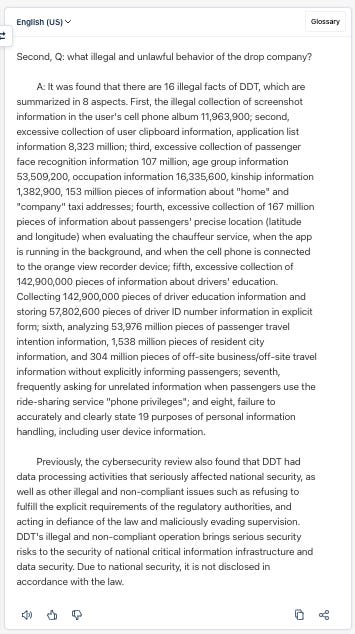
Made in China 2025' thrives with subsidies for tech, EV makers
Nikkei Asia
Kenji Kawase
Seven years after Beijing launched its "Made in China 2025" plan to boost cutting-edge manufacturing in the country, the term has virtually disappeared from public discussions and official documents.
USA
U.S. probes China's Huawei over equipment near missile silos
Reuters
Alexandra Alper
The Biden administration is investigating Chinese telecoms equipment maker Huawei over concerns that U.S. cell towers fitted with its gear could capture sensitive information from military bases and missile silos that the company could then transmit to China, two people familiar with the matter said.
TikTok owner spends record $3.1m on US lobbying
The Australian Financial Review
Emily Birnbaum and Alex Barinka
ByteDance, the Chinese parent company of social media video streaming sensation TikTok, spent a record $US2.14 million ($3.1 million) on lobbying during the second quarter as it sought to fend off escalating US congressional attacks over its privacy and security practices.
Senators intro bill to foster federal move to quantum-resistant technology
The Record by Recorded Future
Martin Matishak
A bipartisan pair of senators on Thursday introduced legislation to motivate federal agencies to shift their information systems to quantum-resistant cryptography.
Limits on personal data gathering by Google, Facebook, others advance in U.S. House
Reuters
Diane Bartz
A U.S. House of Representatives committee approved on Wednesday a bill to create the first U.S. privacy law limiting personal information collected online by companies like Alphabet's Google and Meta's Facebook.
UK
UK blocks University of Manchester sensor deal with Chinese company
BBC
The UK government has prevented the University of Manchester licensing vision-sensing technology to a Chinese company, on national security grounds.
Spies dispute tech firms’ privacy claims
The Times
Fiona Hamilton
Spy chiefs have intervened in the row over end-to-end encryption, stating that technology giants can scan online messages and pick up child abuse material without sacrificing privacy rights.
TikTok is fastest growing news source for UK adults, Ofcom finds
The Guardian
Dan Milmo
Watch out Huw Edwards, the TikTokers are coming. The social video platform is the fastest growing news source for UK adults, according to a survey, but nearly half of people using it for current affairs turn to fellow TikTokers rather than conventional news organisations for their updates.
Big Tech
Meta tweaks Facebook app to act more like TikTok
The New York Times
Mike Isaac
For most of Facebook’s history, its executives have executed a tried-and-true playbook: Mimic the success of others. On Thursday, the company, which has been renamed Meta, continued that tactic with a revamp of its main Facebook app that will change how users browse the service and make it act a bit more like one of its largest competitors.
YouTube to remove videos spreading abortion falsehoods
AP News
YouTube will begin removing misleading videos about abortion in response to falsehoods being spread about the procedure that is being banned or restricted across a broad swath of the US.
Events and Podcasts
The Lawfare Podcast: Ryan Scoville on the role of subnational diplomacy in China's pursuit of U.S. Technology
Lawfare
Jen Howell
Over the past two decades, the Chinese government has cooperated extensively with U.S. state governments on economic issues, replacing Canada as the country with the most diplomatic relations with U.S. states. To discuss how we got here and what it means for U.S.-China relations, former Lawfare managing editor Jacob Schulz sat down with Ryan Scoville, professor of law at Marquette University Law School. Jacob and Ryan discussed new evidence that sheds light on the nature of the relationships between China and U.S. states, the lack of public discourse and transparency around these arrangements, and how this subnational diplomacy has allowed China to acquire cutting-edge American technology.
Jobs
ICPC Senior Analyst or Analyst - China
ASPI ICPC
ASPI’s International Cyber Policy Centre (ICPC) has a unique opportunity for exceptional and experienced China-focused senior analysts or analysts to join its centre. This role will focus on original research and analysis centred around the (growing) range of topics which our ICPC China team work on. Our China team produces some of the most impactful and well-read policy-relevant research in the world, with our experts often being called upon by politicians, governments, corporates and civil society actors to provide briefings and advice.
The Daily Cyber Digest is brought to you by the team at ASPI’s International Cyber Policy Centre.






